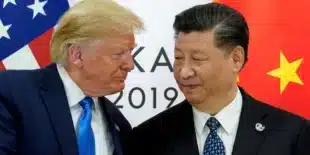After concluding a four-day dialogue with Chinese officials, Treasury Secretary Janet Yellen announced on Monday in Beijing that the U.S. will urge China to revise its industrial strategies, which are seen as detrimental to American employment.
Yellen acknowledged the discussions also touched on security concerns, particularly the U.S.’s unease over Chinese entities potentially aiding Russia in the Ukraine conflict.
Her visit primarily aimed to address the issue of China’s industrial policy, particularly the overproduction in sectors such as electric vehicle manufacturing, battery production, and solar energy equipment. These sectors are key to the Biden administration’s domestic goals, and Yellen highlighted how Chinese subsidies have led to a production boom, threatening global markets and the survival of U.S. and other foreign companies due to a flood of inexpensive Chinese products.
Yellen mentioned that the U.S. plans to continue these discussions during the upcoming economic and financial working group meetings with China, set to coincide with the IMF and World Bank Spring Meetings.
Despite previous European efforts to address these concerns with China showing little effect, and Chinese leader Xi Jinping’s ambitions to establish China as a dominant global force, Yellen emphasized the need for policy adjustment by China.
Yellen’s visit also initiated discussions on “balanced growth,” recognizing that the overcapacity issue is not just external but affects China’s market too, potentially leading to a shakeout in the electric vehicle industry.
She proposed that China could mitigate the overinvestment in supply by boosting consumer spending within its economy, particularly in the green energy sector.
During her visit, discussions with Chinese Vice Premier He Lifeng covered the overproduction issue, with China’s official media reporting that the matter was “responded fully.”
Yellen firmly stated that the U.S., under President Biden’s leadership, would not tolerate a repeat of the past, referencing the impact of below-cost Chinese steel on global industries, including those in the U.S.
Regarding the Ukraine war, Yellen warned of potential sanctions against banks aiding Russia’s military efforts. She underscored the consequences for entities, including those from China, that support Russia’s war efforts.
Chinese officials, including Foreign Ministry Spokesperson Mao Ning, responded by urging the U.S. not to interfere in China-Russia relations or harm China’s legitimate interests.
Yellen’s visit also included a meeting with China’s central bank governor, Pan Gongsheng, as part of the broader discussions.


